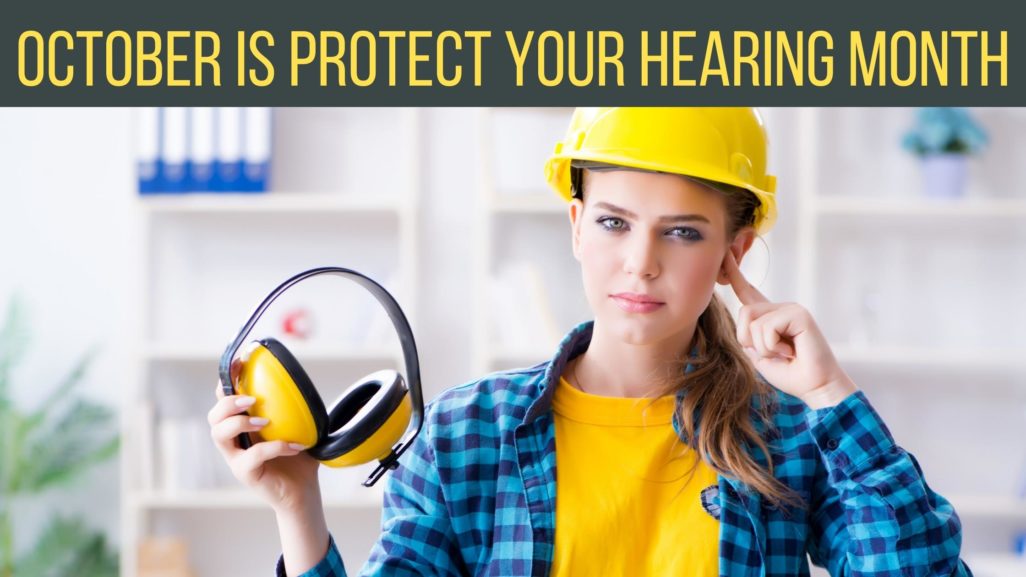It’s National Protect Your Hearing Month! This is a great time to learn more about how hearing works, what sounds can damage your hearing, and how you can protect your hearing. This October, join us in learning more about your ears and what steps you can take to protect your hearing health.
How Hearing Works
Let’s start by talking about how hearing actually works. Knowing a bit more about your ears can make it all make sense.
The outer ears are the perfect shape to direct sound waves down your ear canal to your eardrum. The sound waves move the eardrum, which moves three tiny bones in the middle ear. This movement creates ripples in the fluid-filled inner ear, called the cochlea.
Here’s where it gets really interesting. Tiny hair cells, called cilia, line the inside of the cochlea. When the fluid moves, the hair cells move as well. They send signals about this movement up the auditory nerve and to the brain. There, the auditory regions put together information from all these cells and interpret the signals as the sound you hear.
What is Hearing Loss?
There are several kinds of hearing loss, but let’s take a look at noise-induced hearing loss. This is hearing loss caused by, you guessed it, exposure to really loud sounds. When sounds are extremely loud, the movement in the inner ear is much stronger. The cilia are tiny and fragile, and they’re easily damaged. Loud noise can damage the cells, preventing them from sending signals to the brain.
Noise exposure often has the most effect on the cells that interpret high-pitched sounds. So if you have noise-induced hearing loss, you have more damage to the cells that hear higher sounds. That’s why you might have a harder time having a conversation with a woman or a child who has higher-pitched voices.
What Sounds Cause Hearing Loss?
So the big question is, what sounds cause hearing loss? The volume of sounds is measured in decibels (dB). Any sounds louder than 85 dB can cause cell damage in the inner ear and lead to hearing loss. here are some common sounds and their decibel levels:
- Regular conversations – 60 dB
- City traffic – 80 to 85 dB
- Riding a motorcycle – 90 to 100 dB
- Seeing a movie in theatres – 75 to 105 dB
- Moving the lawn or using a leaf blower – 90 to 100 dB
- Listening to music using headphones – 90 to 110 dB
- Standing near emergency sirens – 120 dB
- Watching a fireworks show 120 to 140 dB
Are you surprised to see so many everyday activities on this list? Think about what you do every day, and try to guess the decibel level. You can check the volume of sounds using a free decibel reader app on your smartphone.
How Loud is Too Loud?
If you’re wondering if the sounds around you are too loud, they probably are. Here’s a rule of thumb for those times you’re just not sure. Try talking to the person next to you. If you have to shout to be heard, it’s too loud! You could be damaging your hearing.
Sounds over 85 dB can cause hearing loss. But some sounds will cause hearing loss sooner than others. If you’re hearing sounds around 85 dB, the cells in your ear may experience some damage, but they can withstand that volume for a little while if you haven’t been around loud noise recently.
However, if sounds are extremely loud, hearing loss can happen right away. Sounds over 110 dB can cause hearing loss in just a few minutes and sounds over 140 can cause hearing loss in just a few seconds!
Protecting Your Hearing
Book a hearing test and find out more about your hearing health. You may have some hearing loss, or have a hard time hearing at certain pitches. A hearing test will help you monitor your hearing health so you’ll be ready to treat your hearing loss as soon as it starts affecting your life.
In the meantime, protect your hearing! Wearing earplugs or earmuffs can reduce the decibel levels of the sounds around you, making it safe for your ears. Visit us today to find out more about your hearing protection options.


